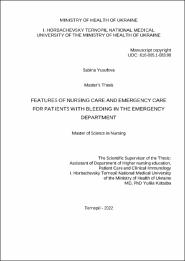| dc.description.abstract | Bleeding is one of the most life-threatening complications of the body. It may be the result of trauma or damage to the arteries, veins and parenchymal organs; erosion of a large vessel in a purulent wound or ulcer; rupture of an aneurysmically dilated artery or venous varicose vein; as well as increased fragility or permeability of the walls of blood vessels, especially in conditions of violation of the blood coagulation system. However, two-thirds of injury deaths and most non-fatal injuries could have been avoided. To do this, it is necessary to timely and correctly provide emergency care to patients with life-threatening bleeding.
To date, we can say with confidence that not all aspects of this problem have been fully studied.
To determine the principles of providing emergency medical care to patients with bleeding in the emergency department, as well as to investigate the features of nursing care for patients with life-threatening bleeding.
To study the main clinical symptoms of external and internal bleeding, the principles of providing emergency medical care to patients with bleeding , the basic principles of bleeding prevention were used to clinical research methods, such as observation, comparison, measurement .
The results of the study deepen theoretical knowledge about the risk factors for bleeding in injuries and various diseases. This pilot study opens up new prospects for using the acquired knowledge to develop algorithms for the provision of medical care for bleeding.
The dissemination of the data obtained in medical institutions, as well as among relatives and close patients with the risk of bleeding, contributes to the widespread use of various methods for the prevention and treatment of life-threatening bleeding and saving the lives of patients. | uk |

